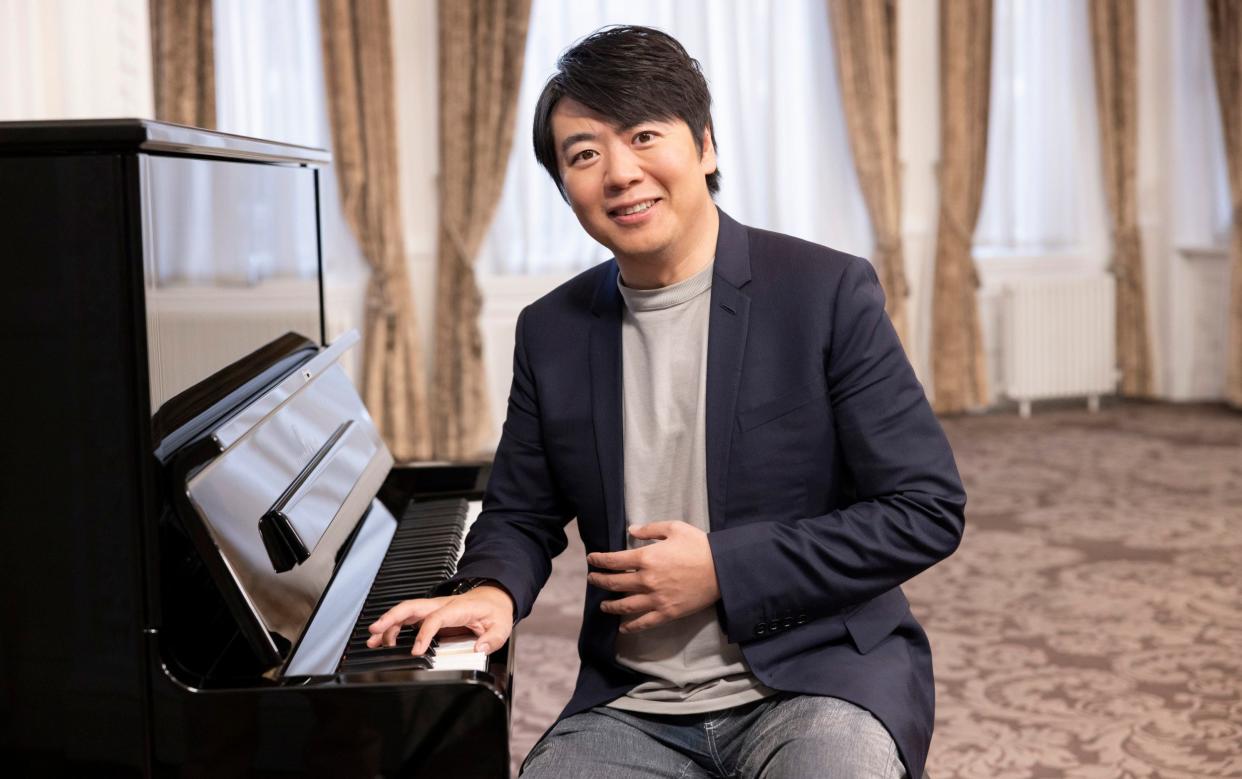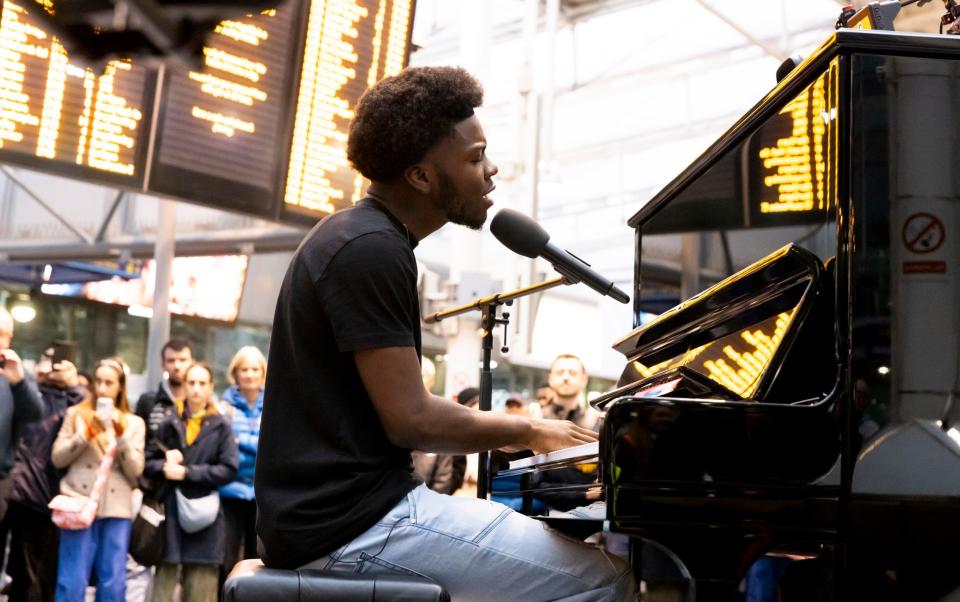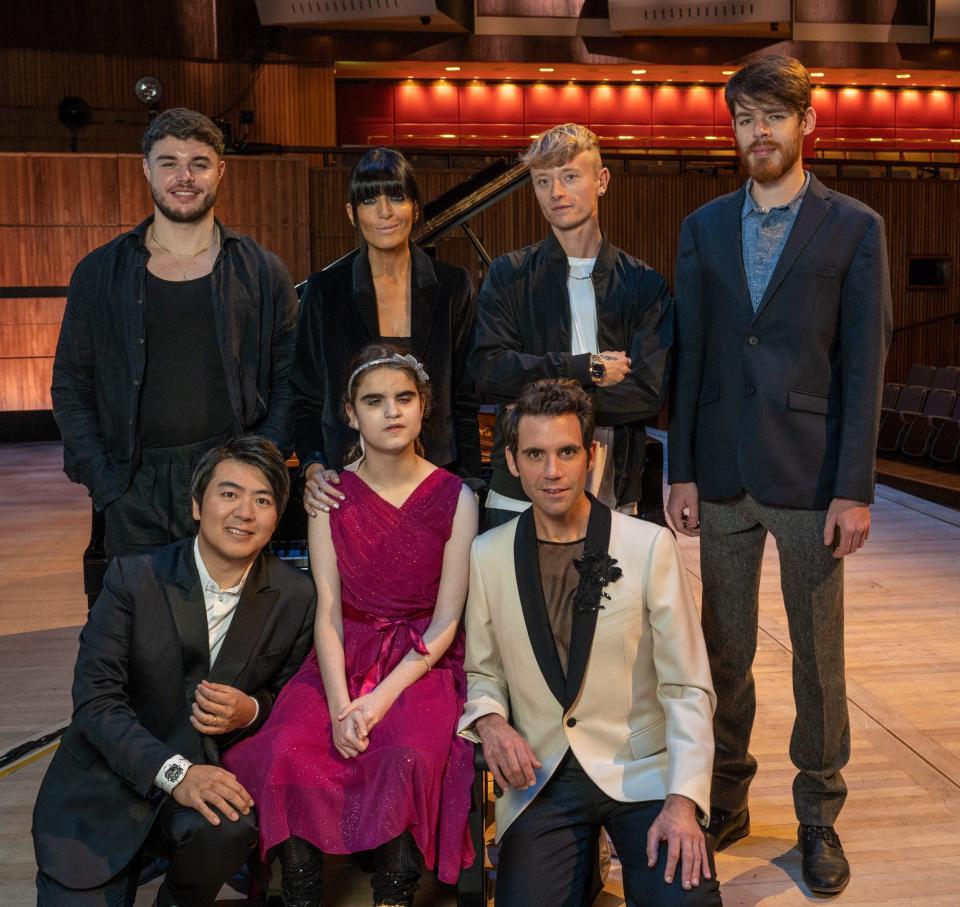Lang Lang: ‘The late Queen told me she would’ve liked to have my fast fingers – she was very funny’

- Oops!Something went wrong.Please try again later.
- Oops!Something went wrong.Please try again later.
- Oops!Something went wrong.Please try again later.
Walk into any major train station in Britain and you will no doubt, among the hustle and bustle, bells and whistles, hear the sound of someone tinkling the ivories. Sixteen years ago, the British artist Luke Jerram launched his Play Me, I’m Yours installation, putting public pianos into railway stations across the world. They are now as familiar a site as ticket barriers and pigeons.
At Liverpool Lime Street station on a chilly late February afternoon, Claudia Winkleman is doing the two-step to Elton John’s Rocket Man. Alongside, three-year-old Harry is swinging a Home Bargains shopping bag and copying her every move. Alas, this is not an audition for Strictly Come Dancing Juniors. Winkleman has traded stilettos for Dr Martens and is encouraging amateurs of a very different disposition.
Watching intently from on high in the first-class lounge are classical concert pianist Lang Lang and polyglot pop star Mika, the secret “judges”.
We are all gathered for the filming of the second series of The Piano, a talent search in Britain’s railway stations for the next top amateur pianists, which culminates in a grand concert finale. The programme comes from Love Productions, the makers of The Great British Bake Off, and has been a huge success for Channel 4, gaining an average of 2.7 million viewers, becoming its best-rating new format since 2017, winning a Broadcast Award for Best Original Programme and being nominated for the Memorable Moment Award at next month’s TV Baftas.

“I know nothing about music,” says host Winkleman, who conducts the pre-performance chats. “But what I find emotional is standing next to the players’ families. There was a girl playing a Tori Amos song – I turned to her mother and tears were streaming down her face… I was gone.”
“My favourite part is when someone misses a train,” she continues. Indeed, young Harry had been shopping with his grandmother when the pair met 20-year-old tracksuit-clad Dan, the Rocket Man, only moments earlier and decided to stay for the afternoon to support him. In front of me, a couple, arm-in-arm, sway in time to the music, while a lady to my left tells me that she’ll “get the next train” because a smartly dressed elderly gentleman playing a jazz standard reminds her of her father.
“If he was here now, he’d be up there on that piano for sure – he used to play anything and we would crowd round and listen. A bit like we all are now,” she says, just as a crane camera swoops over our heads and a make-up artist quickly combs Winkleman’s trademark fringe. Another member of the crew wipes some pigeon poo off the gleaming Steinway.
“Being in the station is fascinating,” adds former child prodigy Lang Lang, who has performed with major orchestras around the world since the 1990s and last week received a star on the Hollywood Walk of Fame. “The good pianists are like a magnet and crowds flock to watch and listen. If you are in a concert hall, you don’t see this effect.”
Last year, blind, autistic and non-verbal 13-year-old Lucy Illingworth blew everyone away at Leeds train station when she played Chopin’s Nocturne in B-flat minor. “It’s unbelievable that she can play this piece,” Lang Lang remarked at the time. “How – how – does she study? This is incredible.” Lucy went on to win the competition.
“You have to be an open person to appreciate classical music,” explains Lang Lang. “Because sometimes you do not know a culture, but through a great work you can understand. It’s like reading Shakespeare – as a Chinese person, you feel the same as the British on a human level.”
At one point in his career, Lang Lang was performing up to 140 concerts a year. “There is a huge cultural difference between the places that I visit, but people are much friendlier to musicians. I met Her Majesty [the late Queen Elizabeth II] here in Liverpool for the Royal Variety Show in 2007. She told me that my hands moved very fast and that she would have liked to have had my fast fingers – she was very humorous.”
The 2008 Beijing Olympics opening ceremony, at which a 26-year-old Lang Lang was the star performer, was a great opportunity to showcase classical music, he explains. “Musicians can only do so much. We are not politicians. We want to make the world more relaxed and peaceful, and more uniform. I am a messenger of peace,” he says.
He’s referring to being awarded the role of United Nations Messenger of Peace in 2013 – an honour that he shares with Yo-Yo Ma, Michael Douglas, Stevie Wonder and Charlize Theron – for promoting global education through his International Music Foundation.
“We don’t have a Lucy this year, but we do have a lot of good international talent,” he reveals. The wildest thing he’s seen so far this series is a baroque-style medley of Lady Gaga and Billy Joel. “There are some songs that I have no clue about, but Mika knows them all. He’s like my Wikipedia.” Your Mikapedia, perhaps?
Mika enjoyed a giddy period of fame in the UK with his 2007 debut album, Life in Cartoon Motion, which spawned the hit singles Grace Kelly and Big Girl. He went on to judge The X Factor in Italy and The Voice in France. He is, however, keen to outline the purpose of this show.
“The DNA of The Piano is that it’s an anti-talent show. We are not trying to make a star and no one is there to further their career. You can’t take part if you make money out of music in any way,” he explains. “We’re using The Piano to tell stories that would not normally see the light of day.”
Mika and Lang Lang are not given any guidance on the participants, who apply online by uploading a video of themselves playing and are then invited to the filmed auditions in the train stations. “It’s up to us,” says Mika. “It’s amazing to see how the collection of people for the final concert came together. It was unintentional that we had three young men (and Lucy) in the end. The guys were all using the piano to help deal with challenges in their lives, whether it was money or mental health issues. It’s important that The Piano has this healing power. And it’s not sad – it’s empowering. It’s not a sob story. They’re playing the s--t out of that piano. The tension is going to be even higher this year because the concert is a real event.”
Quite: this time the final, in Manchester, will be ticketed, with the money raised going towards putting new pianos in train stations.

There is, of course, a central message to The Piano – that the art of music is universal. But the lack of music education in schools continues to be a worldwide problem. Lang Lang’s music foundation was set up in 2008 and upholds the belief that all children should have access to music education and opportunity, regardless of their background. As of 2024, his Piano Lab lessons feature in four UK state schools, with plans for more.
“It’s easier to learn music now there’s all this technology. But it’s a tremendous effort to get it back into schools. There’s a lot of money involved. As musicians, we have to do more to encourage the community to understand that if kids have music education they will do better in other subjects. But we are getting so practical – people ask, ‘Why should I learn music? Does music help me to get more money or a better job?’”
Nevertheless, Lang Lang is ever the optimist. “There are a lot of people who have big dreams in life and we are inspired by their talent. The show is a great platform to get to know each other and, despite our differences, find out how similar we are. The piano is the instrument that brings us together.”
The second series of The Piano starts on Channel 4 on April 28 at 9pm; the live final is tomorrow, tickets: factoryinternational.org

